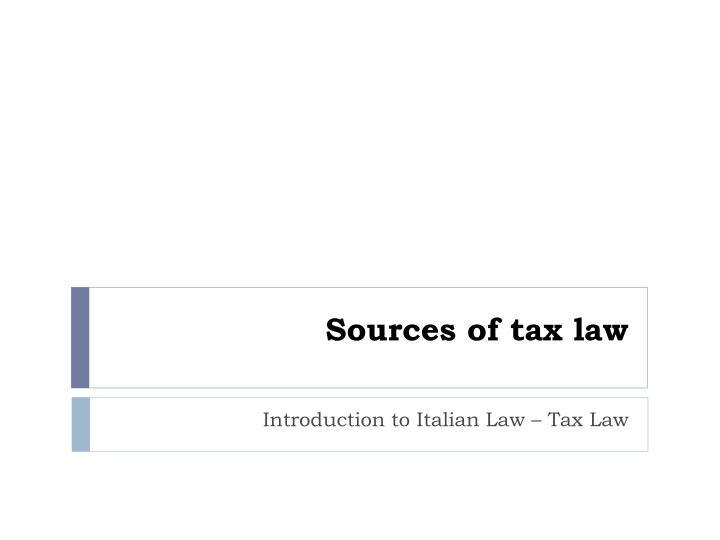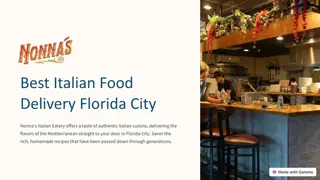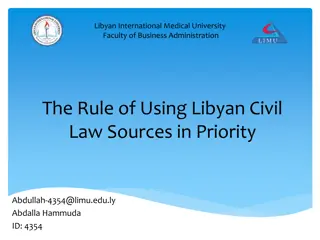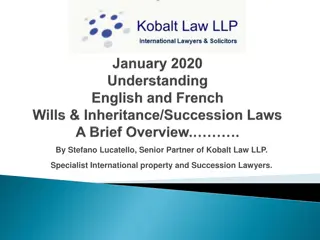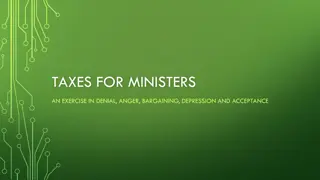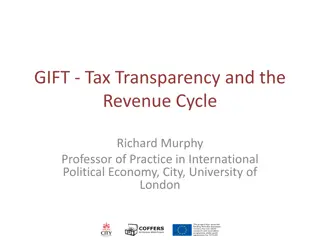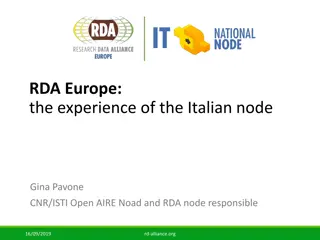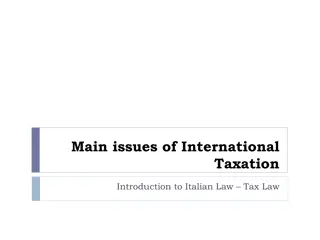Introduction to Italian Tax Law: Sources and Principles
In Italian tax law, obligations of a personal or financial nature can only be imposed by statute law. Primary domestic sources include primary and secondary legislation, supplemented by case law. International sources include bilateral and multilateral treaties. The law sets limits on taxation fundamentals, and secondary sources like regulations provide further details on tax compliance.
Uploaded on Mar 14, 2025 | 1 Views
Download Presentation

Please find below an Image/Link to download the presentation.
The content on the website is provided AS IS for your information and personal use only. It may not be sold, licensed, or shared on other websites without obtaining consent from the author.If you encounter any issues during the download, it is possible that the publisher has removed the file from their server.
You are allowed to download the files provided on this website for personal or commercial use, subject to the condition that they are used lawfully. All files are the property of their respective owners.
The content on the website is provided AS IS for your information and personal use only. It may not be sold, licensed, or shared on other websites without obtaining consent from the author.
E N D
Presentation Transcript
Sources of tax law Introduction to Italian Law Tax Law
Preview How are taxed enacted? Which are the governing principles? Can taxes be repealed? 2 14/03/2025
Sources of tax law The main domestic sources of tax law in most countries are: Primary legislation Secondary legislation Legislation may be supplemented by case law; International sources: bilateral and multilateral treaties. 3 14/03/2025
Sources of Italian tax law Under art. 23 It. Const., no obligations of a personal or a financial nature may be imposed except by law Among financial obligations, we have social security contributions,and taxes So,the source of any tax is necessarily a statute law 4 14/03/2025
Which statutes fulfil art. 23 Cost.? By the term law , art. 23 It. Const. refers to primary sources, id est ordinary State laws and others acts having force of law , as Law Decrees enacted by the government 5 14/03/2025
Law Decree The use of Law Decree is admitted only in the case of necessity and urgency; The Decree shall be submitted immediately to the Parliament to be confirmed (Art.77 It.Const.) New taxes cannot be introduced by a Law Decree (art 4.L.212/2000,Bill of taxpayer s rights) 6 14/03/2025
Delegated Law Decree Under art. 76 It. Const., legislative function may be delegated (with a Law of Delegation), but only for a limited time and specified purposes Delegated Law Decrees are commonly used to enact tax law. The subject can be better managed by the government,given the high specialization needed 7 14/03/2025
Primary and secondary sources Art. 23 It. Const. lays down a statutory limit that is relative , not absolute Primary statutes law shall rule the fundamentals of any tax, such as the taxpayers, the object of taxation, the taxable base and the tax rate Further details can be provided for by secondary sources of law, such as Regulations issued by the Government or by the Ministry of finance In particular, secondary sources of law can regulate tax compliance (tax returns,tax assessments,refunds,etc.) 8 14/03/2025
The risk of abuses of the tax administration The constitutional statutory limit has the primary aim to limit the discretionality of the tax administration Statutory limit is a guarantee for the taxpayers, against an abuse of powers by the tax authorities, which are bound to the law 9 14/03/2025
The chance for a Constitutional review Another advantage of the constitutional statutory limit is the possibility of a judiciary control regarding the respect of the Constitution According to art. 134 It. Const., the Constitutional Court shall decide on constitutional legitimacy of laws and acts having the force of law,adopted by the States and the Regions Secondary sources of law, such as governments regulations, are outside the control of the Const. Court disputes concerning the 10 14/03/2025
The incidental proceedings To file a constitutional review, a person has to file a claim against an ordinary court judge, during the course of the concrete controversy; The person who alleges the unconstitutionality of a law, shall indicate the provisions of the Constitution which are assumed to have been violated; If the judge considers the question relevant and not clearly unfounded, he shall suspend the lawsuit and refer the question to the Const.Court. 11 14/03/2025
Effects of the judgment The Const.Court could deliver: a negative judgment when it considers the law not to be in violation of Constitution; or a positive judgment when it decides that the law is unconstitutional. In the latter case, the law judged unconstitutional ceases its validity in the principal proceeding and also in any other pending lawsuit, with the limit of the defined questions, such as questions on which a final judgment has already been delivered 12 14/03/2025
